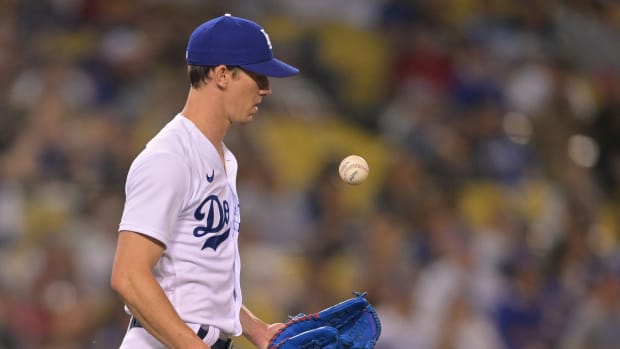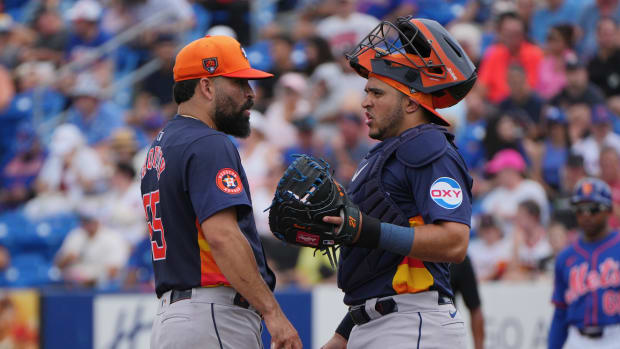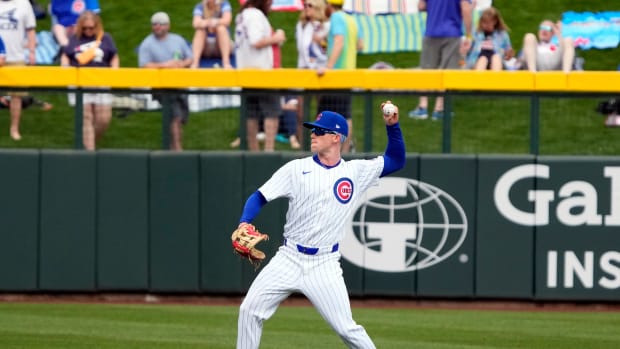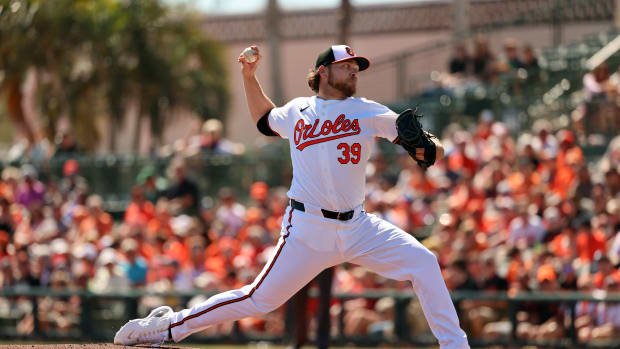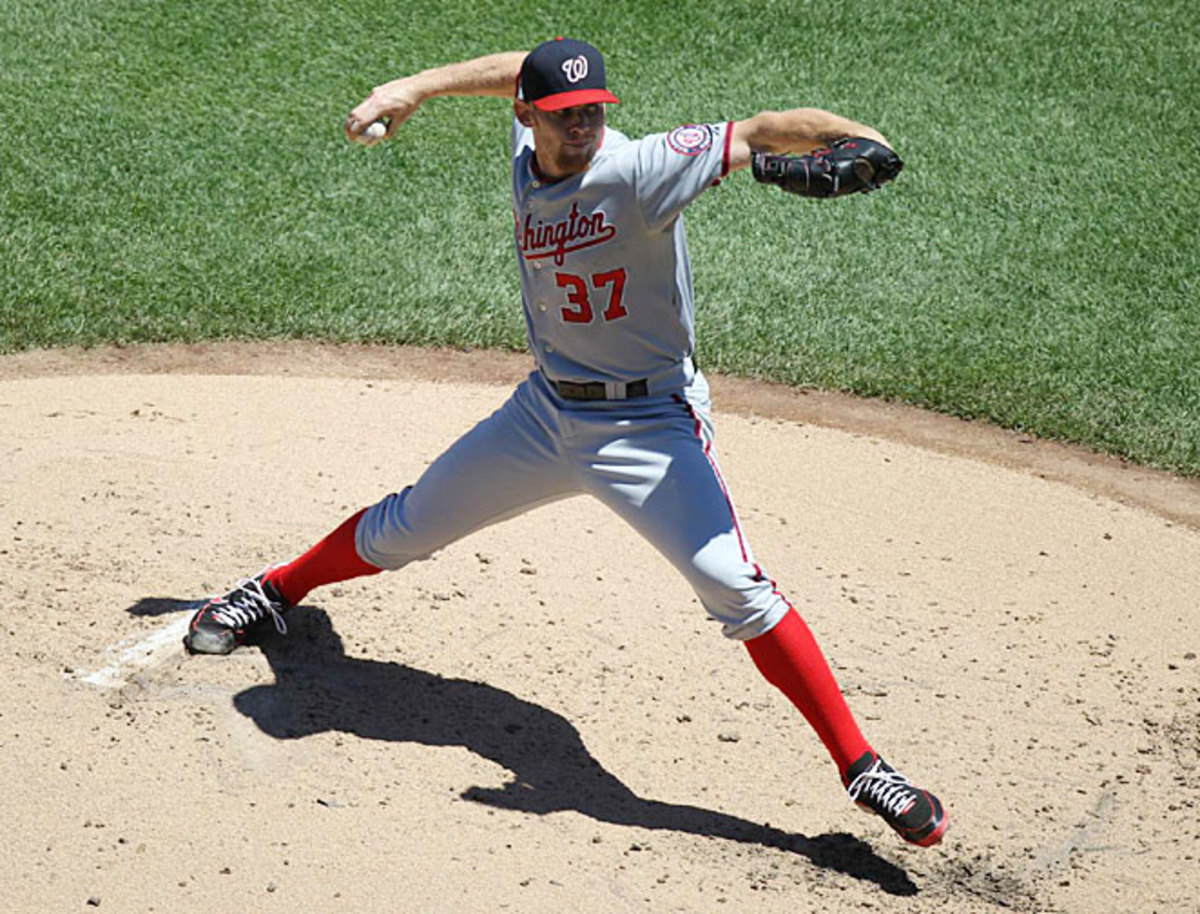
Nationals ready to dominate, even if they won't say so

With no innings limit to hold him back, Stephen Strasburg's talents will be on full display all season long.
Chuck Solomon/SI
For more of SI.com's 2013 Major League Baseball season preview coverage, click here.
Washington Nationals
2012 Record: 98-64, first in NL East, lost NLDS to Cardinals
2013 Projection: 100-62, first in NL East, win World Series over Rays
Davey Johnson stood up at the start of spring training, looked at the loaded roster of young talent before him that had won 98 games the year before and boldly proclaimed that he expected his team not just to win the National League East, but to "dominate."
Alas, this was not a scene that took place at Washington Nationals camp this February in Viera, Fla., but one that happened 27 years ago, at the spring training home of the New York Mets. Then, before the 1986 season, a younger and perhaps brasher Johnson told his charges exactly what he thought and exactly what they likely already knew.
Those Mets did indeed dominate, proving Johnson prophetic by winning 108 regular season games -- no NL team has won that many since -- en route to a World Series championship. These Nationals, though perhaps similarly gifted, would face a tougher road to the title if for no other reason than the fact they most survive and advance through an extra round (or two) or postseason play, a minefield they were unable to navigate last year when they lost in the NLDS to the Cardinals after entering the postseason with the majors' best record.
So Johnson, who as he says is in his "umpteenth year of managing," did not dust off his speech when addressing his club this spring, but it wasn't all that necessary. "We definitely have the potential to be a better club [than last year]," says Johnson. "We not only feel we can compete with anyone, we know we can. There's still an upside to this club."
"I don't think there's any doubt," said Adam LaRoche when asked if his team is the favorites to win the division. "We all knew that coming into camp. Not that it changes the way anybody plays."
It would seem the Nationals didn't need to change anything after last year's romp in which they seized first place all alone for good on June 5 and never let up, finishing four games in front of wild-card winning Atlanta. Instead, general manager Mike Rizzo, he of the non-stop building plan, set about improving his club with three important moves.
First, he traded for Denard Span, the centerfielder and leadoff man he had long coveted, in a late-November swap with the Twins. Span will allow Jayson Werth (No. 2) and Bryce Harper (No. 3) to hit in more natural spots in the batting order while also improving the team's defense by taking over the more taxing position of centerfield, where he ranked first in the American League in range factor in 2012, according to Baseball-Reference.com.
On Dec. 7, Rizzo signed Dan Haren to replace the departed Edwin Jackson in the team's rotation. Neither had glittering numbers in 2012 but Haren's track record is more solid than Jackson's and given Washington's embarrassment of rotational riches, he need be no better than their fourth or fifth best starter.
Finally, on Jan. 17, the Nationals signed closer Rafael Soriano in another move that has as many side benefits as primary ones. In his two most recent seasons as a closer -- 2010 with the Rays and 2012 with the Yankees as the replacement for Mariano Rivera, whom he had acted as set-up man for the year prior -- Soriano has saved 87 games in 94 chances with a 2.00 ERA.
That signing has the trickle-down effect of strengthening the Nats' bullpen by allowing Tyler Clippard, who saved 32 games last year, and Drew Storen, who saved 43 in 2011, to move into set-up roles.
For all those improvements on the margins, the real fun will come in watching Washington's superstars in full bloom. Last season, Harper, now 20, and ace Stephen Strasburg, now 24, had abbreviated turns in the spotlight. Harper didn't debut until late April and though a strong finish got him to 22 home runs and helped vault him to National League Rookie of the Year honors, he was more a complementary player than a true star as a 19-year-old rookie.
Only the White House, meanwhile, was a more closely guarded Washington institution than Strasburg's right arm last season. In his first full year after Tommy John surgery, the flamethrowing Strasburg went 15-6 with a 3.16 ERA and 197 strikouts but was limited to 28 starts and 158 1/3 innings. This year, no such limits are in place, allowing Strasburg to fully unleash his awesome arsenal for the first time.
With those two in the roles of Darryl Strawberry (lefthanded slugger) and Dwight Gooden (righthanded power pitcher), the Nats very much have the look of the '86 Mets. Which is to say, they have the look of a champion.
Biggest Addition: Denard Span
Considering Washington rode an army of young arms from the depths of the division in 2010 to its first postseason appearance just two years later, it might have seemed strange that it was willing to part with one of its most prized pitching prospects. Rizzo, though, didn't hesitate to do just that in order to get Span. He had to send Alex Meyer, a hardthrowing righty and former first-round pick who went 10-6 with a 2.86 ERA at two Class A stops in his first rookie season last year, to Minnesota, but this was a move well worth making.
In addition to the Span's many virtues, outlined above, that says much about not just Span and the Nats' desire to have a club that is, as Rizzo put it, "here to win," but also about the depth of organizational pitching that would make someone like Meyer expendable. Indeed, with Strasburg, Gio Gonzalez, Jordan Zimmermann and Ross Detwiler all under team control for multiple seasons, the Nationals won't have to worry about their rotation for at least a few more years.
Biggest Loss: Mike Morse
When the Nats added Span for the outfield and re-signed LaRoche to play first base, Morse became the odd man out. Still, his power -- he hit 18 home runs in just 102 games in 2012 and had 31 in 2011 -- will be missed.
What They Do Best: Pitch
Washington finished second in the majors in ERA, WHIP, batting average against and fewest home runs allowed per nine and fourth in strikeouts. With a full season from Strasburg, the development of Zimmermann and Detwiler and the upgrade in the bullpen, those numbers may get even better.
What They Do Worst: Make contact
Nationals hitters swung and missed on 24.7 percent of all pitches in 2012, the most in baseball. As a team, they struck out 1,325 times, fourth most in the game.






























